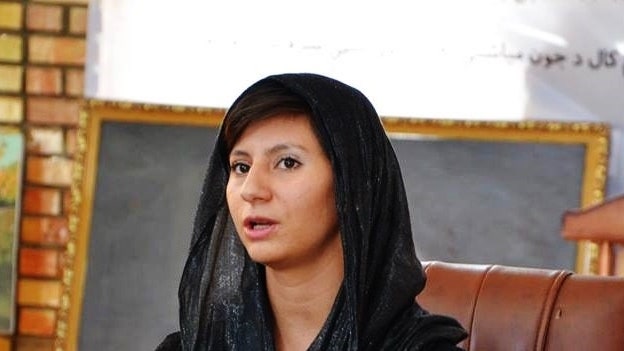Afghan Women Are Fighting for Our Rights—Join Us

[ad_1]
In July my younger sister and I booked last-minute tickets to fly from our homes in D.C. to our mother’s home in Kabul, Afghanistan. We wanted to see our family because, ever since the U.S. announced its withdrawal last spring and the Taliban accelerated its takeover, our window to visit the country safely was shrinking. With the Taliban on the offensive, I knew this could be one of my last opportunities.
During my week there, we shared meals together, all seven of my siblings in the same room for the first time in nine years. We took a little road trip to the Panjshir Valley, outside Kabul, picnicking and enjoying the gorgeous landscape. I texted my stateside husband pictures and told him I hoped to bring our future kids to Afghanistan—to show them that their mother is not just from war and conflict but also from beauty, culture, good food, clear waters, proud mountains, and generous people.
But between savoring the spreads of cheese, bread, and dumplings and the precious time alongside my family, I also spent the week witnessing how much the situation for women was deteriorating. Many women were dressing more conservatively, with longer dresses and bigger headscarves. When I did go out—which wasn’t that often—you could feel the fear and intensity in the air. After 20 years, the Taliban was returning to power.
When I was six years old, my family escaped to Pakistan because the Taliban took over our country and hanged the former president’s body from a traffic light. We left everything behind and lived in poverty. We returned to Afghanistan after the Taliban was overthrown in 2001. For my mother, the idea of being forced out of her home and starting over terrified her even more than the escalating situation.
“When will you leave?” I asked her during my visit this summer. “Not until the rest of my kids leave,” she replied in Farsi. Of my siblings living in Afghanistan, I had three sisters—Rada, an artist, and Shaharzad and Fatima, who both worked for different nongovernmental organizations (NGOs) focused on human rights issues. My brother Ibrahim was employed by the Afghan government. Our youngest brother, Zabihullah, had recently graduated high school. Afghanistan was home.
On July 31, 2021, I flew from Kabul back to the U.S. as the Taliban was advancing and capturing the provinces. Its soldiers were going door-to-door, hunting down artists like my sister, human rights defenders like my other sisters, and Afghan government workers like my brother. But my family was in Kabul, and the Afghan government said it would defend the capital city. President Ghani went on TV and told us not to be afraid. He said he would stay in Afghanistan until his last breath. This false hope gave us the feeling that my siblings had more time. They wanted to stay and keep working to help defend our country and free our children and women. They didn’t have weapons, but they believed in the power of their voices, their art, their advocacy.
Less than two weeks later, news broke that President Ghani had fled the country and the Taliban had seized Kabul. My remaining family was among the millions who would no longer be safe. We knew that was it. We are everything the Taliban wants to destroy. From my D.C. home office 7,000 miles away, my mindset shifted from how my loved ones and other activists would remain in Afghanistan to how they could get out.
My tiny nonprofit, Free Women Writers, and a sister organization, Femena, started sending money to women in Afghanistan trapped in dangerous situations, many who had fled from their homes to be safe from the Taliban. We started a GoFundMe and sent funds for food, safe housing, and other basic needs. But then Western Union and MoneyGram stopped transferring money to Afghanistan, and we couldn’t get resources to those in need. So we had to get creative. For one guesthouse, for example, we sent money to the owner’s son in Europe. On August 15, Free Women Writers had about $6,000 in our bank account. By August 23, we had $300 left.
Meanwhile, the situation in Kabul continued to deteriorate. A day before the Taliban took the city, on August 14, my mother and siblings grabbed what bags they could carry—clothes, shoes, and a few things one needs to start over—and went into hiding at a friend’s house that was closer to the airport. The Taliban shut down all commercial flights. So even as we scrambled to apply for visas for family, friends, and women’s-rights advocates to leave Afghanistan for any country that would let them in, there were no tickets to book. Evacuation on the heavily guarded military flights were the best hope. Afghan civilians and foreigners rushed to try to get to the gates. It was a complex maze of shifting entry points, some controlled by the Taliban, others supposedly safe.
[ad_2]
Source link




